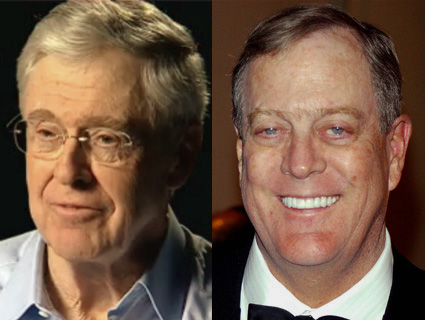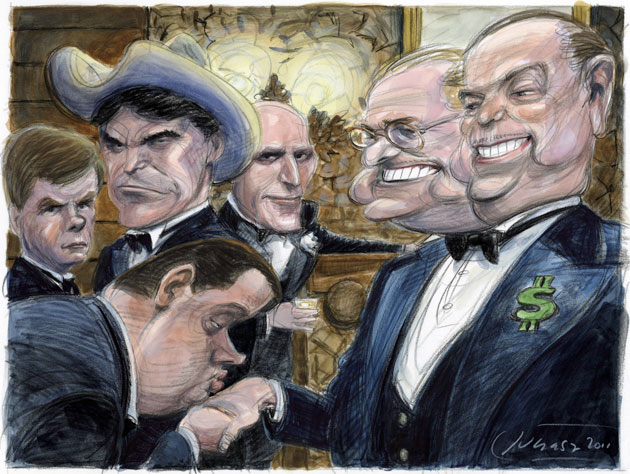
Charles (left) and David Koch<a href="http://www.youtube.com/watch?v=VhCDK1OCRlc">kochmbmproductions</a>/YouTube; Globe Photos/ZUMA
Next week, hundreds of business executives and wealthy conservative donors will arrive in Palm Springs, California, at the behest of Charles Koch, the billionaire industrialist and older half of the Koch brothers duo. The occasion is the latest Koch donor retreat, dubbed the “billionaires caucus” by some, an exclusive, two-day confab with a speaker list that features governors, senators, and members of the House Republican leadership. It is the first Koch retreat since the 2012 elections.
According to a previously unpublished preview of the April 28-29 gathering, the Kochs will unveil a new plan to recruit and train political candidates who will advance their free-market worldview. Another priority is improving the conservative movement’s outreach to “growing demographics” such as Latinos, young people, and women. The preview, obtained by Mother Jones, was emailed to attendees in March by Kevin Gentry, a top Koch aide. (A Koch spokeswoman did not respond to requests for comment about Gentry’s email.)
Another big item on the Kochs’ agenda is a long-awaited post-mortem on last year’s elections. Charles Koch announced in December that he was pushing back the winter retreat from January to late April so that an internal review of his circle’s election strategies could be completed. Despite raising hundreds of millions of dollars, the Kochs, their allies, and groups they bankrolled failed to defeat President Obama, retake control of the Senate, or increase the Republican majority in the House. In his email, Gentry promises a “rigorous post-election assessment” that “must be geared toward productive next steps.”
Here’s Gentry’s email to donors:
The Kochs held their first retreat in 2003, and the size and scale of the event has grown in recent years, as the Kochs became better known and raised more money to combat the Obama administration. As Mother Jones has reported, attendees include some of the wealthiest conservative donors in the country. At the Kochs’ June 2011 retreat in Vail, Colorado, private equity executives Ken Griffin and John Childs, Amway cofounder Richard DeVos, Cintas Corporation founder Dick Farmer, and North Carolina multimillionaire Art Pope all showed up. Held over two or three days, these retreats feature panels with columnists, academics, think tank types, and activists; cocktail and dessert receptions; and usually remarks by Charles Koch. Those who attend are urged to pledge big money to fund the groups fighting to advance the Kochs’ free-market mission.
The Kochs and their acolytes believe it is their duty to stop what Charles Koch calls “the greatest assault on American freedom and prosperity in our lifetimes.” He began a September 2010 letter (PDF) outlining plans for an upcoming donor retreat by asking, “If not us, who? If not now, when?” At the Vail retreat, Koch said the 2012 elections will be “the mother of all wars.”
The Kochs lost that war. Romney blew his opportunity, and gaffe-prone Republican candidates like Todd Akin of Missouri and Richard Mourdock of Indiana stumbled in states where the GOP was poised to gain new Senate seats. That may explain why the Kochs want to develop their own recruiting and training operation for potential political candidates. In his email, Gentry says the Kochs are looking for “principled and effective advocates of free enterprise to run for office.”
Currently, there are several conservative organizations such as American Majority and FreedomWorks that look to groom candidates for elected office at the local, state, and national levels. The Palm Springs preview suggests the Kochs are moving into this field, and a turf battle could ensue.
Ramping up outreach to Latinos, young people, and women is a no-brainer. Obama trounced Republican presidential candidate Mitt Romney at the voting booth in these demographics. The most diehard conservatives recognize that the Republican Party needs fresh blood and a bigger tent if the party is to survive, let alone thrive. “In not too many years, Texas could switch from being all Republican to all Democrat,” Sen. Ted Cruz (R-Texas) told The New Yorker last year. “If that happens, no Republican will ever again win the White House.” At the Palm Springs retreat, Gentry writes, Koch allies will discuss how “to more effectively communicate to these growing demographics, all of which play a critical role in advancing free enterprise.”
Gentry’s email also hints at what may have been the Kochs’ biggest failing in 2012: They put a boatload of money behind a mediocre message that didn’t reach the right people. He writes, “Understanding key customer segments—and more importantly the issues that matter to them—will be crucial to educating and mobilizing key constituencies in future educational and political battles.”
Quietly, some conservative activists have complained that the Kochs’ big data operation, Themis, didn’t work that well—and that their message didn’t get to the right people (read: the right voters). So it’s no surprise that Koch Industries, the privately-held conglomerate run by Charles Koch, is reportedly mulling a bid to buy eight major newspapers, including the Los Angeles Times and the Chicago Tribune. Those outlets would give the Kochs an audience of tens of millions of readers in the United States and abroad.
With little to show for after the 2012 elections, the Kochs have been retooling parts of their political operation. Their flagship organization, Americans for Prosperity, parted ways with more than 100 field organizers and its chief operating officer, Tracy Henke. Generation Opportunity, another Koch outfit with a youth focus, got a new president as well. Clearly, the Koch brothers are thinking long and hard about what went wrong in 2012. Next week’s retreat will focus on the changes they want to see in the conservative movement as it forges onward.














